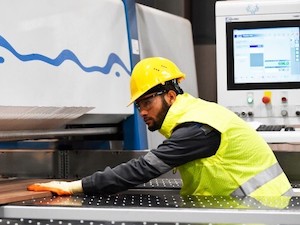EBRD helps Moroccan furniture maker improve competitiveness and energy efficiency
Options
EBRD helps Moroccan furniture maker improve competitiveness and energy efficiency

Having studied and lived in Italy for years, Flexibois Managing Director Aziz Boukhari dreamt of bringing the know-how and experience he had gained in Rome back to his hometown, Casablanca. Passionate about chic and stylish furniture, he founded his own business in Morocco, initially as an importer and distributer of furniture. He soon realised that he needed to tweak his business model.
“You can’t import a predefined model that European or American customers like and then just pass it on to Moroccans,” he says. “Locals consume goods in their own way; they have their own expressions, their own colour preferences.”
This is why Mr Boukhari soon began to manufacture his own furniture, hiring more than 30 new employees and expanding the company’s facilities. He is now able to combine traditional Moroccan design with modern European style and manufacturing processes. His priority is to remain on trend by offering tailor-made solutions to Moroccan consumers and creating quality furniture that will last without damaging the environment.
“We’re like the fashion industry in that sense,” he says. “We are always the early adopters, trying to offer something new. And because we’re passionate about it, we find that it doesn’t feel like just a job.”
Even though Flexibois has always been as sustainable as possible “We work with wood derivatives. That automatically means we are felling fewer trees, because we’re working with composites rather than solid woods,” Mr Boukhari explains - they recently became even greener with the development of a new production line.
Manufacturing furniture requires a lot of energy and generates large amounts of waste, so Mr Boukhari wanted to invest in a more sustainable production line and equipment. The EBRD supported the company in acquiring two modern machines, which are equipped with highly efficient electric motors.
The new machines have generated energy savings of 37 per cent for Flexibois and reduced its emissions by 27 tCO2 per year. Thanks to increased precision, they are also safer for employees and reduce waste. Moreover, they have improved product quality by eliminating errors in the manufacturing process.
“We can produce large quantities of goods while also minimising our energy consumption. In other words, we use less energy now because we don’t need lots of machines to carry out different tasks,” says Mr Boukhari.
The EBRD’s investment is part of its Green Value Chain (GVC) Morocco credit line, funded by the EU, the GCF and the Republic of Korea. The facility provides funding to partner financial institutions for on-lending to local small and medium-sized enterprises (SMEs) operating in value chains for investment in high-performing equipment that leads to energy, water and resource efficiency. It also aims to reduce gender gaps and promote women’s access to climate finance, contributing to the creation of sustainable markets for a green economy.
Mr Boukhari’s vision now is to help develop the sector further and set an example for other Moroccan entrepreneurs who want to make their dreams come true and accomplish ambitious projects while remaining kind to the planet.